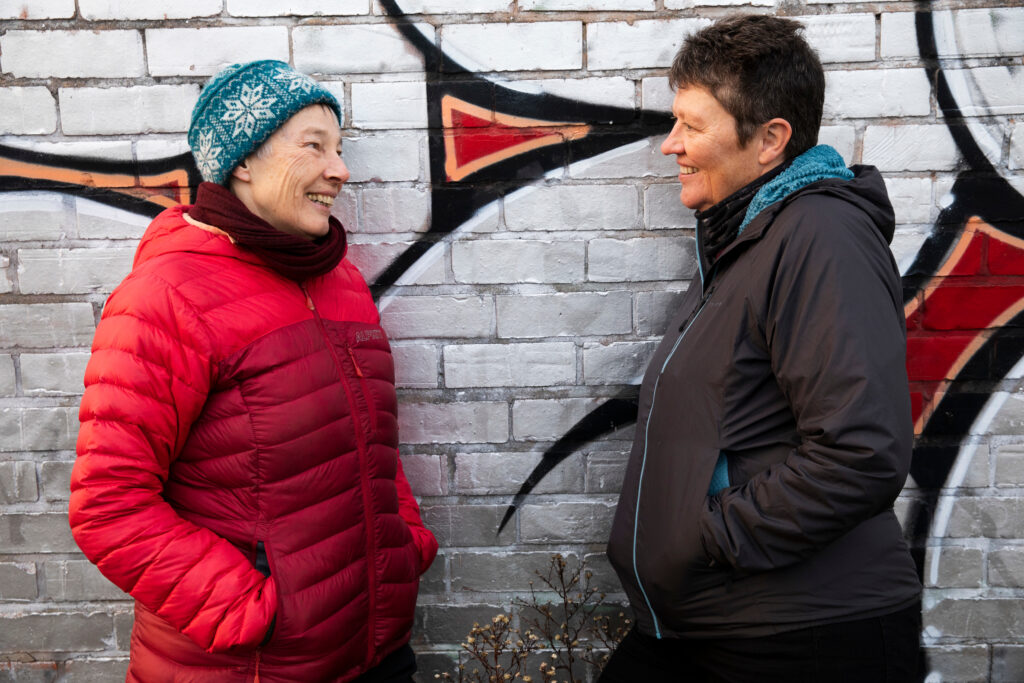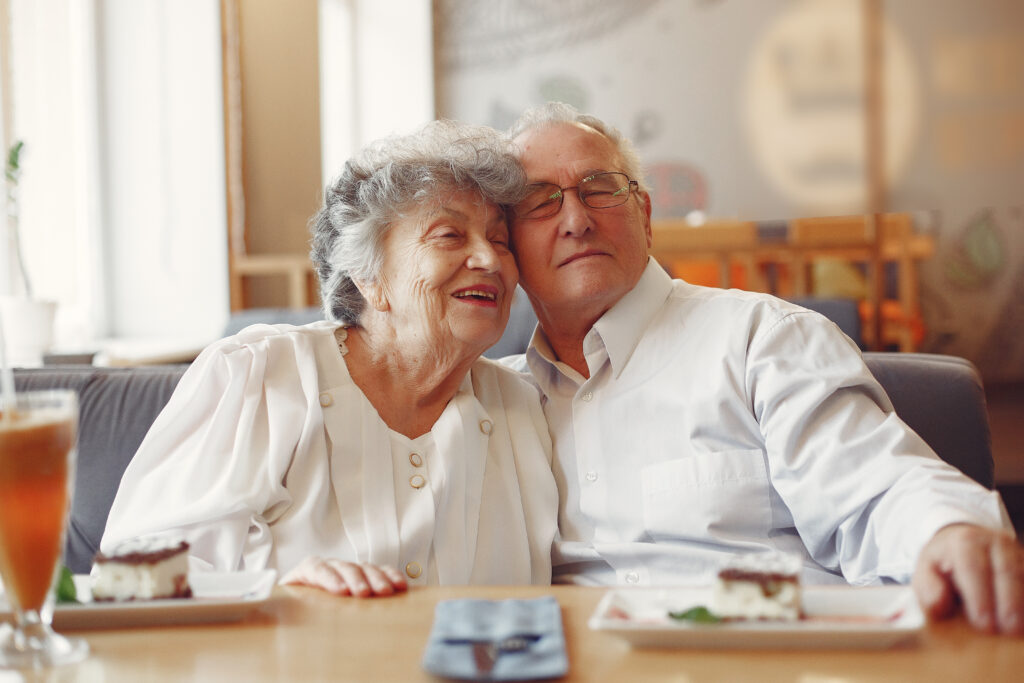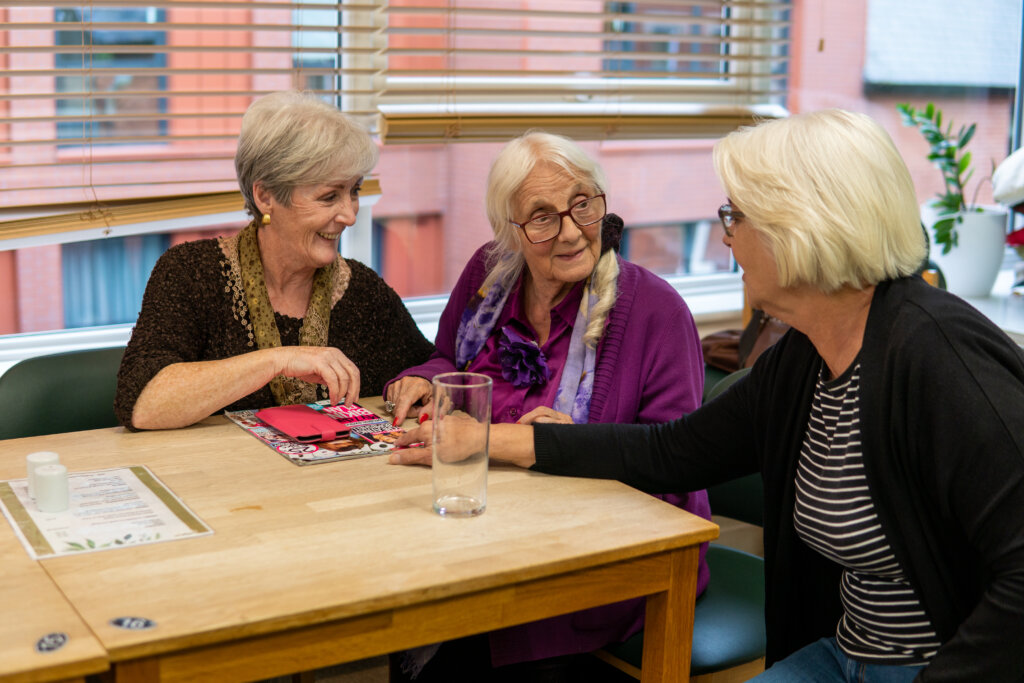
Relationship dynamics
The opportunity and desire for intimate relationships may vary from person to person throughout our lives and depends on a number of factors. As we come into transitional life periods, such as later life, our health or the health of our partners, life experiences, living arrangements and intimate relationships begin to change. Even though we may live with other people, it does not mean that we can’t feel lonely or unsupported.
Research shows that in heterosexual relationships, men report getting more support from their partner than women do. Women often get support from their friends or other family members. This can make things tough on our relationships and even impact our desire to have sex.
There is also evidence that same sex and other gender minority relationships face different relationship challenges because of society’s views and histories of discrimination. Many LGBTQI+ people have experienced stigma and discrimination because of who they are or who they love. This can make finding an intimate partner difficult. This study found however, when LGBTQI+ individuals found an intimate relationship, many stated that it was the first place they felt truly accepted and understood.

As we get older, losing a partner unfortunately becomes more of a reality. Women often live longer than men and are more likely to provide informal and unpaid care for significant periods of our later life stages. This can make our relationships tough and may be a challenging life transition.
Relationships can be complex. Things like our health, the help we get, friendships and what society thinks can all play a role. It’s important to be compassionate and understanding to keep our relationships strong and happy.
Healthy relationships
Relationships can be deeply rewarding and fulfilling experiences in our lives. We can learn to grow and love our partners as well as support each other’s health and wellbeing. Whilst this may happen easily for some people, healthy relationships can be challenging and take work and negotiation.
Healthy relationships can look like:
- Mutual respect
- Talking openly
- Being there for one another
- Setting boundaries
- Trust and honesty
- Supporting each other
Healthy relationships can lead to connection, companionship and maintaining our individual identities. They can also help us to feel valued and secure and enjoy shared experiences with another person.
Looking for more information?
- It’s Time to Talk is a website worth checking out if you would like to learn more about healthy relationships. It includes specific information on healthy LGBTQI+ relationships as well as healthy relationships and disabilities, which you may find useful.
- Relationships Victoria, provide great information for couples seeking to build a successful relationship.

Unhealthy relationships
Some relationships can involve behaviour that is not healthy and can be unsafe and damaging. This includes domestic, sexual or family violence.
It is important to recognise that older women face unique challenges when it comes to abusive relationships. Older women are more likely to face housing insecurity, financial difficulties or poverty, and power imbalances in the family unit. There are also structural issues such as where healthcare professionals may unintentionally overlook signs of domestic violence. These factors can prevent us from accessing the necessary support and care we need.
A violent relationship can look like:
- Physical assault or threats – any threat or physical acts of violence against you (including hitting, kicking, choking etc.)
- Sexual assault or abuse – this includes performing sexual acts or forcing you to view sexual/pornographic material that you do not feel comfortable with
- Emotional or verbal abuse – any threats used against you that belittle you and make you feel unsafe. This includes isolating you from social supports
- Financial abuse – including controlling your or your family’s finances
Relationships Victoria have resources available that can help you to better understand domestic violence and ways you can stay safe.
If you think you are in an unsafe situation, call 1800 RESPECT. There is support available to help you in these situations.
To learn more about violence in relationships, watch this video by Our Watch.
Understanding consent in relationships
Consent is an important part of relationships and intimacy, even as we age. Consent is not just saying “yes” or “no”, it is a continuous process of respect and communication between individuals. It is having freedom to make our own choices and express our desires.
Consent is actively sought, and enthusiastically given, through talking openly and honestly. It allows us to build trust, care and boundaries for physical and emotional intimacy. It is about making sure everyone feels safe, heard and empowered to express our needs. Consent in relationships creates an environment where we can share love and closeness in a way that feels rewarding.
In Tasmania, Queensland, New South Wales, the ACT and Victoria, affirmative consent is now law. These reforms aim to better protect victim-survivors from sexual violence and send a clear message that any form of sexual offence is unacceptable. Western Australia has announced plans to introduce similar laws.
Below you can watch a video by Sexual Health Victoria, where Australians talk about their experience with consent and dating. Although this video is aimed at a younger audience, it is a relevant conversation to anyone who is currently in or seeking an intimate relationship.
Handling grief and the loss of a partner
Experiencing grief and the loss of a partner is a complex and deeply personal journey. It is important to recognise that we all experience grief differently. Some may feel very sad, others may feel confused, guilty or even angry. For some people, talking about grief can be really hard.
Here are some actions you can take that might be helpful:
- Take the time to acknowledge your emotions, whether it is writing them down, talking to a friend, speaking to a counsellor or psychologist, or attending a support group
- Engage in self-care activities. This will look different for everyone but includes doing activities and things you enjoy and make you feel happy
- Practice mindfulness
- Connect with others who have also experienced grief and the loss of a loved one
For more advice, Relationships Victoria’s website shares some tips on dealing with grief. Grief is a journey and it’s okay to ask for help when you need it. If you need help, you can contact Relationships Australia to book in with a counsellor.
If you need immediate support, call Lifeline on 13 11 14.

1800 Respect (2023) National Domestic Family and Sexual Violence Helpline
ABC News (2023) Actions, not pity, needed to address Australians’ loneliness, mental health advocates say
Australian Human Rights Commissions (2021) Safety and security for older women
Australian Institute of Family Studies (2019) Assisting families with aging-related relationship issues
Australian Institute of Family Studies (2020) Powers of attorney and financial abuse of older people in Australia
Barrett C, Whyte C, Comfort J, Lyons A, Crameri P (2014) Social connection, relations and older lesbian and gay people . Sexual and Relationship Therapy
Bender AA, Burgess EO, Barmon C (2020) Negotiating the lack of intimacy in assisted living: Resident desires, barriers, and strategies. Journal of Applied Gerontology
Brown SL, Shinohara SK (2013) Dating relationships in older adulthood: A national portrait. National Library of Medicine
Certified Practice Accountant (2023) Financial abuse of older people
Choi NG, Ha JH (2016) Relationships between spouse/partner support and depressive symptoms in older adults: Gender difference. National Library of Medicine
Department of Social Services (2022). Seniors connected program
Dickson FC, Hughes PC, Walker KL (2007) An exploratory investigation into dating among later-life women. Western Journal of Communication
Ewings SJ (2019) Unique challenges facing older Australian women in the early 21st century. The University of Sydney
Fuller H, Pikala T, Mullen A (2022) Strengthening late-life family connections. North Dakota State University
Harvard Health (2019) Mars v Venus: The gender gap in health
Huang SF, Huang CH, Chen, SF, Lu LT, Gua JL (2019) New partnerships among single older adults: a Q methodology study. BMC Geriatrics
It’s Time to Talk (2023) Home
Lifeline (2023). About us
Luong G, Charles ST, Fingerman KL (2012) Better with age: Social relationships across adulthood. Journal of Social and Personal Relationships
Malta S (n.d.) Intimacy and older adults: A comparison between online and offline romantic relationships. Swinburne University of Technology
Malta S, Hocking JS, Lyne J, McGavin D, Hunter J, Bickerstaffe A & Temple-Smith M (2018) Do you talk to you older patients about sexual health? Health practitioners’ knowledge of, and attitudes towards, management of sexual health among older Australians. Australian Journal of General Practice
National Council on Ageing (2023) The widowhood effect: How to survive the loss of a spouse
Nowakowski AC, Sumerau JE (2019) Women's sexual health in later life: gaps and opportunities in research and practice. Womens Health (Lond)
Premier of Victoria (2022) Affirmative consent now law in Victoria
Relationships Victoria (2023) Coping with grief and loss tip sheet
Relationships Victoria (2023) Counselling
Relationships Victoria (2023) Healthy relationships tip sheet
Relationships Victoria (2023) Partners
Relationships Victoria (2021) Safe from violence
Seniors Right Victoria (2023) Financial abuse
Simon JA, Davis SR, Althof SE, Chedraui P, Clayton AH, Kingsberg SA, et al. (2018) Sexual well-being after menopause: an International Menopause Society White Paper. Climacteric
Steckenrider J (2023) Sexual activity of older adults: let’s talk about it. The Lancet
SWAN (n.d.) Fact sheets
Tencza M (2023). Relationships among the elderly: The effects on one’s health and psychosocial wellbeing. Journal of Nursing
Thomas PA, Liu H, Umberson D (2017) Family relationships and wellbeing. Innovation in Ageing
Utz RL (2005) The single older woman: Life after marriage. The Gerontologist





